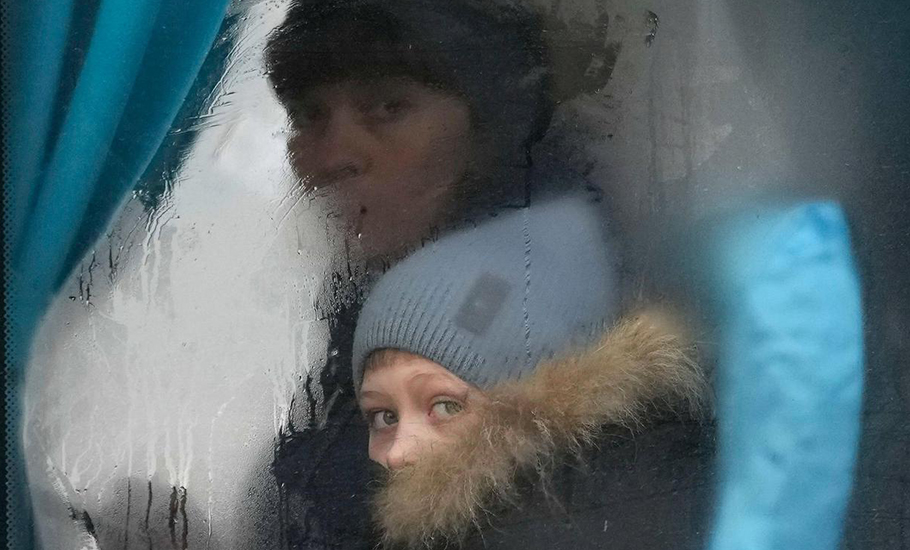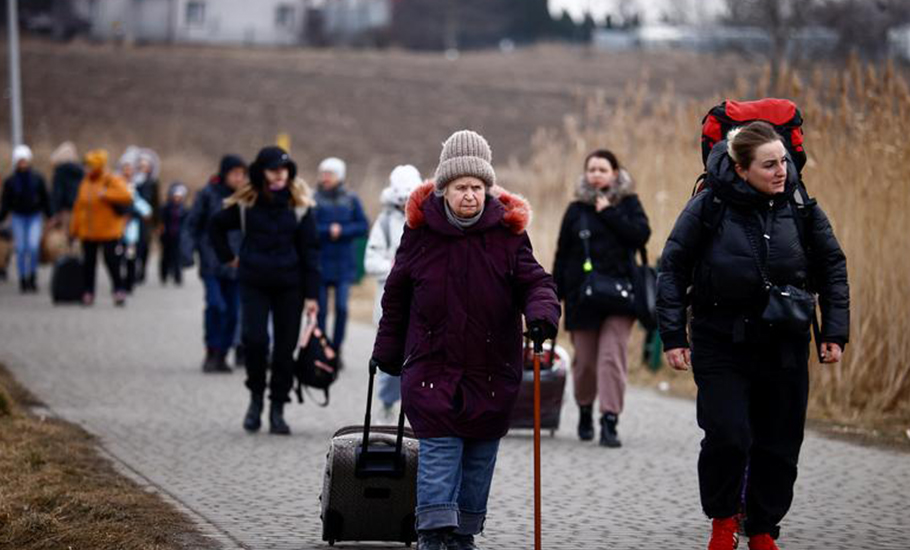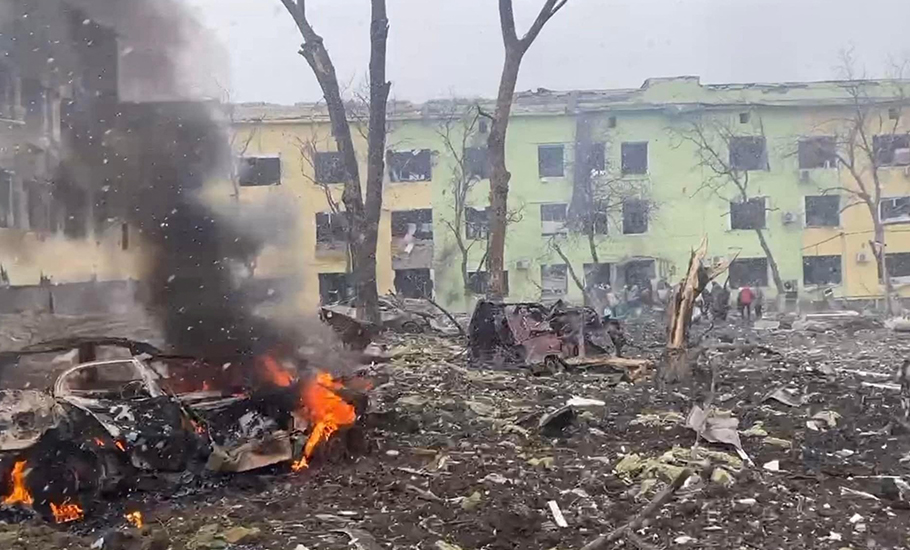
- Home
- News
- Analysis
- States
- Perspective
- Videos
- Education
- Entertainment
- Elections
- World Cup 2023
- Features
- Health
- Business
- Series
- Economy Series
- Earth Day
- Kashmir’s Frozen Turbulence
- India@75
- The legend of Ramjanmabhoomi
- Liberalisation@30
- How to tame a dragon
- Celebrating biodiversity
- Farm Matters
- 50 days of solitude
- Bringing Migrants Home
- Budget 2020
- Jharkhand Votes
- The Federal Investigates
- The Federal Impact
- Vanishing Sand
- Gandhi @ 150
- Andhra Today
- Field report
- Operation Gulmarg
- Pandemic @1 Mn in India
- The Federal Year-End
- The Zero Year
- Premium
- Science
- Brand studio
- Home
- NewsNews
- Analysis
- StatesStates
- PerspectivePerspective
- VideosVideos
- Entertainment
- ElectionsElections
- Sports
- Loading...
Sports - Features
- BusinessBusiness
- Premium
- Loading...
Premium

Russia-Ukraine war presents a scary spectre for women

About a fortnight since Russia began pounding bombs on Ukraine, thousands have died, thousands others have been maimed, and millions have left the country turning into refugees looking for shelter elsewhere. Among the dead, injured and left homeless are men, women and children underscoring the fact that war affects us all. It is, however, widely acknowledged that war impacts men and...
About a fortnight since Russia began pounding bombs on Ukraine, thousands have died, thousands others have been maimed, and millions have left the country turning into refugees looking for shelter elsewhere. Among the dead, injured and left homeless are men, women and children underscoring the fact that war affects us all.
It is, however, widely acknowledged that war impacts men and women differently. Women and girls suffer disproportionately from violent conflict because they suffer not only from the by-products of war, but are also targeted as a ‘strategy of war’. Rape and sexual violence are instruments of violent conflicts that are used sometimes to extract revenge and at other times to hit the enemy’s morale.
Doubly-hit women
Two factors make experiences of war unique for women. First, war naturally disrupts everyday life by adversely impacting essential requirements such as healthcare facilities, food and shelter, public services, and children’s education. These disruptions tend to doubly hit women. It happens because distribution of resources among women and men has been historically unequal. Any disruption in supply of resources, thus, reduces the women’s share further adding to the hardships they face in their daily lives.
The second factor which uniquely and disproportionately affects women is their vulnerability to sexual violence. In violent conflicts, women’s bodies turn into sites to assert dominance and superiority, not just by men from the ‘outside’ but also men from inside the conflict-hit region’s boundaries. Rape, sexual exploitation, and trafficking of women and girls are common in all war zones.
And so Ukrainian Foreign Minister Dmytro Kuleba’s claim that Russian soldiers committed rape in Ukrainian cities was not met with shock even if it did lead to a feeling of helplessness in several quarters.
Impact of war on women during conflict
Societal networks such as community and kinship work as the basic institutional barriers that shield women from sexual violence in a conflict situation. But when men are on the frontlines, even this weak barrier is washed away making women more vulnerable. The absence of men and their ‘protective barrier’ provides the perfect opportunity for other men, both within or outside the community, to inflict violence on women. This also emboldens them to loot the scarce and essential resources. Women being treated as the ‘spoils of war’ is a tale as old as the history of war itself.

When hospitals and healthcare centres are razed to the ground, women suffer more. As the war wages in Ukraine, the United Nations estimates suggest that 80,000 women will give birth over the next three months. There are already reports of women giving birth to children in bunkers and shelters. Their health and dignity compromised because of staying in shared spaces, as is often the case, will go down as an unaccounted war casualty.
Migration forced by conflicts is especially unkind to women. The risk of trafficking increases as women also tend to be used as a trade-off by families for safe passages. Most refugee camps are uninhabitable for any human but especially so for women given their need for hygienic spaces during menstruations, or when feeding babies.
For the most basic necessities such as food and water which are in limited supply at such camps, women are often forced into sex as a leverage.
Impact of war on women post-conflict
When war leaves a trail of dead men, women are left behind to take care of the community, elderly, and the children. Women, who were earlier dependent on the male head of households by social design, are suddenly left to fend for themselves and their families. Their problem is aggravated by their comparative lack of education, skills and training for livelihood activities.
To make ends meet, women are forced to take up informal jobs which are usually low-paying, and outside the purview of basic social security. They are compelled to take care of the daily chores in addition to doing odd jobs. Their status as sexual objects makes them vulnerable to sexual violence. Even as they suffer physically, they find little time to deal with the emotional trauma caused by the war.
Women also find themselves at the receiving end of increased domestic violence because world over men have been found to vent their frustration on the women of the house. In a situation where their life is thrown out of gear, escaping abusive relationships becomes even more difficult.

Well before Russian tanks rolled into Ukraine, President Vladimir Putin used the bloody Balkan wars of the 1990s as a justification for the invasion of Ukraine. Ironically, the lives of women who are still suffering from the effects of the wars present the strongest argument against the war.
Experiences of women, who worked for SOS hotlines in Serbia, provide a glimpse into the brutality women faced well after war was presumed to be over. War veterans raped their wives, battlefield returnees raped women in bars, and refugees were raped wherever found. Battlefield returnees also carried with them stories of rape on the frontlines.
Women were not even safe from UN ‘peacekeepers’. UN’s humanitarian army, known as ‘blue helmets’, was allegedly involved in sexual abuse, forced prostitution, and trafficking of underage girls in post-war Bosnia-Herzegovina. Kathryn Bolkovac, the whistleblower who was fired post her damning report, describes sexual abuse by peacekeepers as UN’s “worst kept secret”.
Rape as a weapon of war
In 1994, during the Rwandan genocide, rape was used as an act by Hutus to break the morale of Tutsi men. About half a million Tutsi women were raped, mutilated, and murdered as part of ethnic cleansing.
Back home, Partition left thousands of women raped and murdered in a bid by warring sides to inflict maximum damage on each other. Women from both sides of the border faced rape and sexual violence. Many men killed their own women and children to ‘save’ them from falling into the hands of the ‘enemy’.
Experiences of women during wars are globally shared. Women suffer the same injustices world over in situations of war.
The fetishisation of Ukrainian women (especially girls) is reported to have skyrocketed since the Russian invasion of Ukraine. Pornhub has come under fire for its role in promoting pornographic content related to Ukraine via its ‘Trending Searches’. While the site had always hosted content with the key search term Ukraine, in the aftermath of the war more people began seeking out videos of Ukrainian women engaging in sexual activities.
Ironically, men also control institutions of justice, where women face prolonged harassment in their elusive quest. Consider Serbia, where the Law on Civilian Victims of War, states that one can only be considered a ‘civilian victim of war’ if they have over 50 per cent ‘physical damage’. This has a direct impact on tens of thousands of women, mostly Bosniaks, who were raped by Serbian men in the 1990s.
Addressing war on women during war
Since women experience war differently, they also have a different perception of peace. According to the Women’s Charter of Peace and Security, peace for women is not just the absence of war, but the “absence of fear, life without violence, freedom from male sexual violence, the absence of hatred, misery, all forms of discrimination, injustice and, of course, the application of the laws of transitional justice, demilitarisation”.
The humanitarian laws, definition of war crimes and UN resolutions notwithstanding, the international will to address sexual war crimes has been found to be totally lacking.
The international community has repeatedly failed women in the aftermath of war. The horror unfolding in Ukraine has, however, presented a renewed opportunity to the world to mitigate women’s suffering by ensuring they are neither treated as the spoils of war nor left to live a life devoid of dignity in refugee camps.

